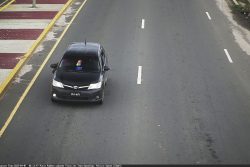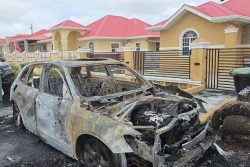 Sometimes it is difficult to be positive in a society where tragic events occur regularly. Some shrug them off, while some pretend not to notice. Perhaps they employ coping mechanisms that allow them to escape such miseries penetrating their souls; miseries that, if allowed, could easily slip one into a state of depression. But many of us choose to commiserate even when the situation is not close to us. We come together to mourn, express outrage or simply comfort the afflicted.
Sometimes it is difficult to be positive in a society where tragic events occur regularly. Some shrug them off, while some pretend not to notice. Perhaps they employ coping mechanisms that allow them to escape such miseries penetrating their souls; miseries that, if allowed, could easily slip one into a state of depression. But many of us choose to commiserate even when the situation is not close to us. We come together to mourn, express outrage or simply comfort the afflicted.
Recently, I had to choose to pull myself out of a fog that had encircled my life. On August 29th, I lost an aunt in an automobile accident in the United States of America. Shortly before it happened, I had written about the inevitability of death, but nothing could prepare me for the tragedy within my family. There was the initial shock, then the tears, followed by disbelief. I started to think that what was happening was a dream and that I would wake and there would be no reason to grieve.
There were days when I surrendered and allowed the grieving process to take place, but slipping down a path of despondency–giving up control of my emotions—is something that I could not allow to linger. I had to get up, had to make a choice to smile and had to remind myself that within me is the power to control the way I allow any circumstance to affect my life.
But even as I cope with my aunt’s death, the high number of recent fatal accidents here has not escaped me. When anyone dies on the road, it is a tragedy, but when children lose their lives in such circumstances, it is particularly painful to grasp. Four-year-old Raveena Harris, four-year-old Ambeka Providence, 11-year-old Hema Singh, seven-year-old Tina Halley and ten-month-old Marvin Halley are children whose names have been added to the long list of road fatalities. Harm to any of our children in any form should spark outrage and should motivate revolutionary actions with the aim of making things better so that our young ones can be safer.
In a perfect world, children would never die in any circumstance. Youth is the promise for the future where all things are possible, but when they are cut off before they have even had a chance to understand life, it is hard to comprehend. The loss of those children is an opportunity for us to reevaluate our practices as road users.
Regularly, I am faced with the impatience and arrogance of both pedestrians and drivers. One is not immune to being caught up in the muddle of road rage, even if one is careful on the roads. A few months ago, another pedestrian and I were almost hit while using a pedestrian crossing at Robb Street and Avenue of Republic.
A driver, who did not want to wait, sped through and almost hit us. There was a smirk on his face. I was angry and that moment reminded me that many people do not think about the devastation their destructive actions can cause on the roads. That driver did not take time to consider the consequences that could have resulted because of his impatience.
He took no time to consider that the women he almost hit could be mothers, no time to think about the futures we would have planned for ourselves and no time to consider the value of our lives. But it is no secret that most Guyanese drivers do not abide by the rules where the pedestrian crossing is concerned.
It is a regular occurrence for pedestrians to have to wait longer than they should for courteous drivers to stop. Most drivers cruise by like they never saw a book of traffic laws or passed the theoretical aspect of the examinations to become qualified drivers. But it’s not only drivers that are at fault.
Pedestrians are not blameless. The stoplights at Camp and Regent are a perfect example as to what happens when pedestrians do not stop to think about the possible consequences of their actions. It has proven to me that pedestrians sometimes exercise very little patience. Why is it so difficult for some people to wait a minute or a few seconds for the green man to appear? They scamper across the streets when drivers have the green light. Sometimes, the horns blowing do not faze them. I often stand there thinking that if they were to get hit, it is the drivers who would most likely be in trouble.
I wrote about minibus culture a few months ago and highlighted the disregard many drivers and conductors have for passengers. Nothing has changed. Many minibuses are still speeding, still carrying overloads and blasting loud music. Recently, I witnessed a minibus conductor buying alcoholic beverages while still on duty. He served the driver and two of his friends who were passengers. I saw none of the other passengers get off the bus. Our silence often kills us.
A few days ago, I was traveling in a taxi when an impatient driver bullied her way past us. When I questioned how some folks get their licences, the taxi driver, without hesitation, said, “Dey pay dey $50,000. Wha’ you feel?”
The culture of “buying licences” is not something that is hidden. A beneficiary of this practice would not have completed or passed the theoretical and practical driving training and would have paid some amount of money to someone in the system to acquire their licence. I shudder to think how many of the accidents that have occurred on our roads where the drivers were at fault cases were where they illegally acquired their licences.
The time for us to make our roads safer has long passed. Five children dying in road accidents within a few weeks is alarming. As adults, we have to take measures to protect our children. Car seats and seat belts have to become the norm for them.
Drivers should constantly remind themselves of the five Cs for road safety: Caution, Care, Common Sense, Courtesy and Consideration. Pedestrians should also follow the five Cs. Our lawmen also have to become more adamant in enforcing the laws. And passengers have to start using their voices to fight against the minibus culture.
For those who mourn the loss of those children and even as I continue to mourn my own aunt, the story does not have to end for them because they have passed. Let their deaths be a catalyst for change. We must challenge those who engage in reckless driving, driving under the influence, speeding and those who are under-qualified drivers. We have the power to change the culture.







